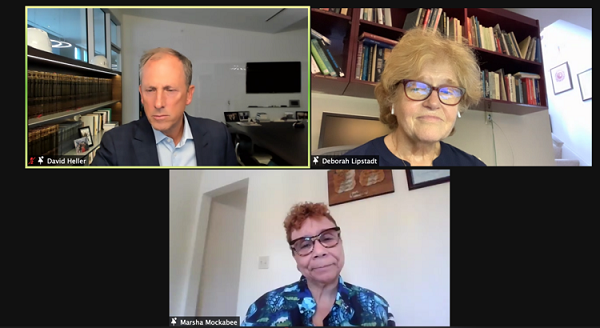06/29/2021
Lipstadt Tackles Antisemitism, Solutions in Webinar
- Share This Story

Deborah E. Lipstadt, the Dorot Professor of Modern Jewish History and Holocaust Studies at Emory University in Atlanta, answers Urban League of Greater Cleveland CEO Marsha Mockabee’s question as to how the Black community and Jewish community can work together as allies during a webinar June 24. The webinar was moderated by Jewish Federation of Cleveland board chair J. David Heller and sponsored by the Federation, the Anti-Defamation League and AJC Cleveland.
McKENNA CORSON | STAFF REPORTER
Article reprinted with permission from Cleveland Jewish News
Deborah E. Lipstadt, the Dorot Professor of Modern Jewish History and Holocaust Studies at Emory University in Atlanta, spoke about the rising trend in antisemitism, unpacked different forms of prejudice and ways the world can come together to overcome Jew hatred in a webinar hosted by the Jewish Federation of Cleveland with the Anti-Defamation League and AJC Cleveland June 24.
The virtual lecture was moderated by Federation board chair J. David Heller and featured live questions asked by community members. The event was attended by 315 people.
At a time when the ADL reports record-high amounts of antisemitism in Ohio and dramatic increases across the nation, Lipstadt described the trend as “a perfect storm of antisemitism in a way that we haven’t seen before.”
But while some might think Jew hatred is relatively new to the world’s timeline, Lipstadt shared that that notion is far from correct. “Antisemitism has been legitimately called the oldest or longest hatred,” Lipstadt said. “... That makes it very difficult to combat, because it is so in the weeds and the roots of society.”
Today, antisemitism is seen across the political spectrum and displayed in a plethora of ways.
Lipstadt highlighted two popular types of antisemites. One is the ‘overt antisemite,’ where someone expresses dangerous, threatening views either in-person or online about the Jewish community. The other is the ‘dinner party antisemite,’ where someone espouses negative Jewish stereotypes in a way they don’t believe to be harmful.
Lipstadt broke down the template for antisemitic stereotypes and the four elements it consists of: money, nefarious power, malicious intellect and small in number but dangerously powerful.
Because of antisemitism’s strong, long-lasting hold on the world, Lipstadt admitted that she doesn’t think the prejudice will ever be defeated.
“I’m not sure (how to fight antisemitism),” Lipstadt said. “I know there are things we can do, but I’m not sure we can fully eradicate it. ... There’s no easy fix.”
One way she believes people can fight antisemitism is by teaching everyone that even though victims of antisemitism don’t look like “traditional victims” of prejudice, they are, and their alerts of experienced antisemitism should be taken seriously.
She also stressed that people – particularly victims of other prejudices – should be taught that combating prejudice isn’t a zero-sum game, meaning groups shouldn’t want to help others because they desire to gain something from those they aid.
At the center of the battle against antisemitism are the soldiers. Lipstadt emphasized that everyone of all religion, race, ethnicity, gender, etc. has to gather their metaphorical pitchforks and join in on the fight.
Those who aren’t Jewish can condemn antisemitism and teach those in their family, circle of friends, community, political leanings, etc. that antisemitism is wrong and cannot be taken lightly.
“This is not only our fight, not just because we want people to care about us, be kind to us,” Lipstadt said. “... I don’t need your sympathy. But I need your being a comrade at arms, and I need to be your comrade at arms too. We need to see this as a prejudice, as a systemic problem throughout our society.”

